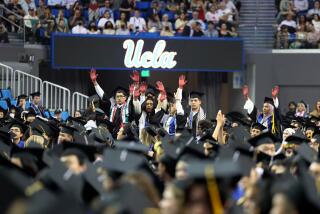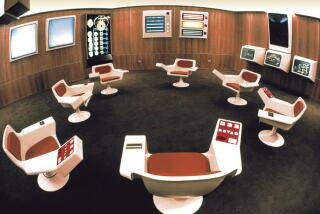THE CUTTING EDGE: FOCUS ON TECHNOLOGY : THE SCENE / UCLA : Internet Founders See Its Future in Every Aspect of Life
- Share via
No cake, no candles, not even a simple round of “Happy Birthday” was offered to celebrate a revolution that began at UCLA 30 years ago and ultimately eclipsed the walk on the moon, the war protests and the urban riots of the era.
But UCLA’s School of Engineering and Applied Sciences did throw a party--if you can call a symposium a party--last Thursday for its most famous offspring, the Internet.
What is now a global computer network began when a refrigerator-sized machine in Boelter Hall called an Interface Messaging Processor transmitted a few digital bits to a computer in the same building.
The machine became the first site on the Arpanet--the government-funded network that evolved into the Internet. Although the particular event that marked the inception of the Internet is debated, at the Westwood campus they honor their contribution on Sept 2, 1969, as the start of the global computer network.
“The Internet has many fathers who claim to be responsible for this child,” UCLA Chancellor Albert Carnesale told a group of Internet pioneers. “There’s no question that much of that parentage happened right here at UCLA.”
So a traditional celebration with birthday cake, candles and ice cream seemed inadequate. Instead, 450 engineers, entrepreneurs and plain old Internet users gathered at UCLA for a symposium on the myriad ways the computer network has changed the world.
As the attendees filed into a spacious lecture hall, black-and-white pictures of Internet “fathers” flashed onto a giant movie screen.
“But that’s all you’re going to hear about history,” said Leonard Kleinrock, the UCLA computer science professor who was in charge of the first Interface Messaging Processor experiment and many others that followed. “Instead, we will focus on the vision of where this is going--as if anyone actually knows.”
One thing Kleinrock and his UCLA brethren clearly did know is that when it comes to shaping the Internet’s future, the business world is at least as influential as computer scientists. The symposium itself was held at the Anderson Graduate School of Management, across campus from the engineering school. And the first panel consisted of senior executives from computer industry behemoths Microsoft, Intel, Cisco Systems and America Online.
“The Internet changes everything,” said Kip Hagopian, a co-founder and special limited partner with Brentwood Venture Capital who moderated the first panel discussion. “These companies all recognize that, and they are capitalizing on that.”
That view was shared by the Internet start-ups on the next panel, who said today’s electronic-commerce applications merely hint at what will be possible when the computer network is fully built.
“When the cost of an Internet node goes down to a few dollars, every device you touch will be connected to the Internet, and that will change life forever for every man, woman and child,” said Henry Samueli, co-founder and chief technology officer of Broadcom, which makes chips to facilitate high-speed Internet connections.
While a sizable portion of the audience dressed in business attire, most of the crowd had really come to see Kleinrock and his band of “Internauts,” whom they feted with a heartfelt standing ovation.
The most popular of them was Vinton G. Cerf, who was a graduate student in Kleinrock’s lab in 1969 and later, with Robert Kahn, created what is known as the TCP/IP protocol that governs Internet transmissions. Attendees wielding cameras asked to take their picture with Cerf--now senior vice president of Internet architecture and technology for MCI WorldCom--and followed him onstage seeking his autograph.
*
The symposium’s finale found the Internet pioneers sharing their visions for the Internet’s future. Kleinrock described a network so ubiquitous that “wherever you are, you can plug into the Internet. The Net will become like electricity--it will always be there, but it won’t be in your face.”
Kleinrock, Cerf, Kahn and Larry Roberts, who wrote the original plan for the Arpanet, couldn’t resist debating the technical merits of next-generation Internet protocols. But when it comes to predicting the Internet’s future course, the “old farts” should defer to teenagers because “they’re the ones who will decide what becomes of the Net in the next five to 10 years,” Cerf said.
That answer didn’t get him off the hook. So, as he is wont to do, Cerf responded with a poem. One verse offered:
Networks, networks everywhere
No place is undisturbed.
The revolution’s underway.
Its pace cannot be curbed.
*
Times staff writer Karen Kaplan can be reached at karen.kaplan@latimes.com.







